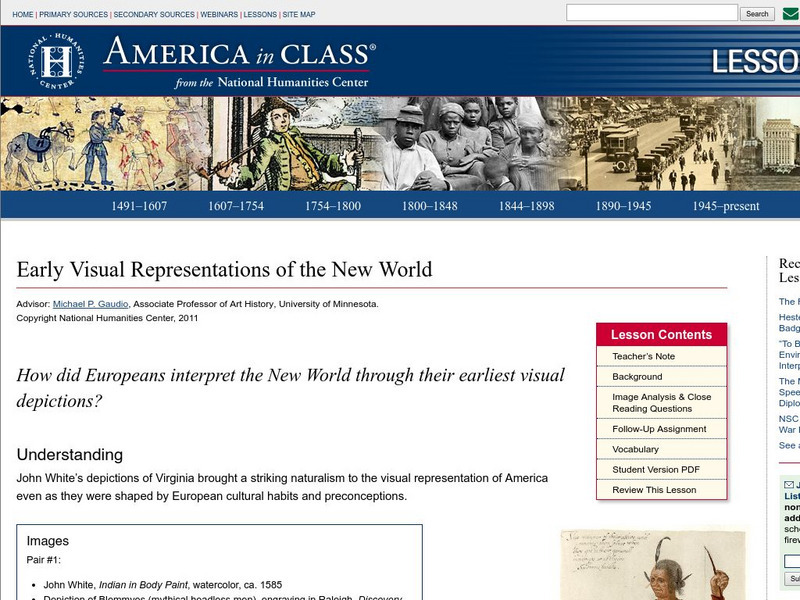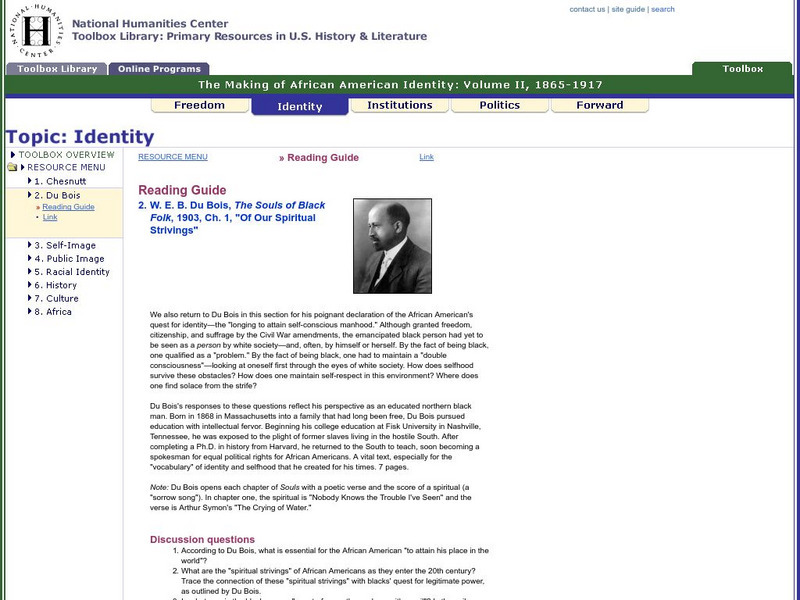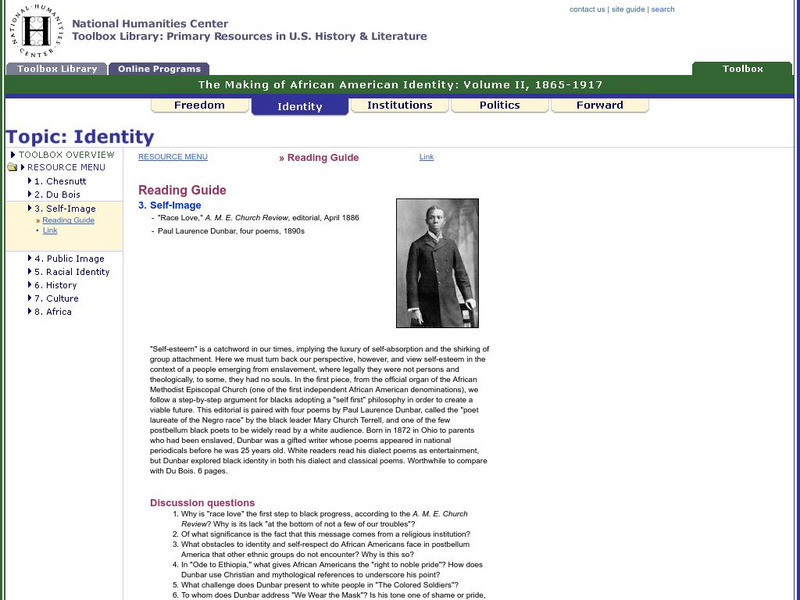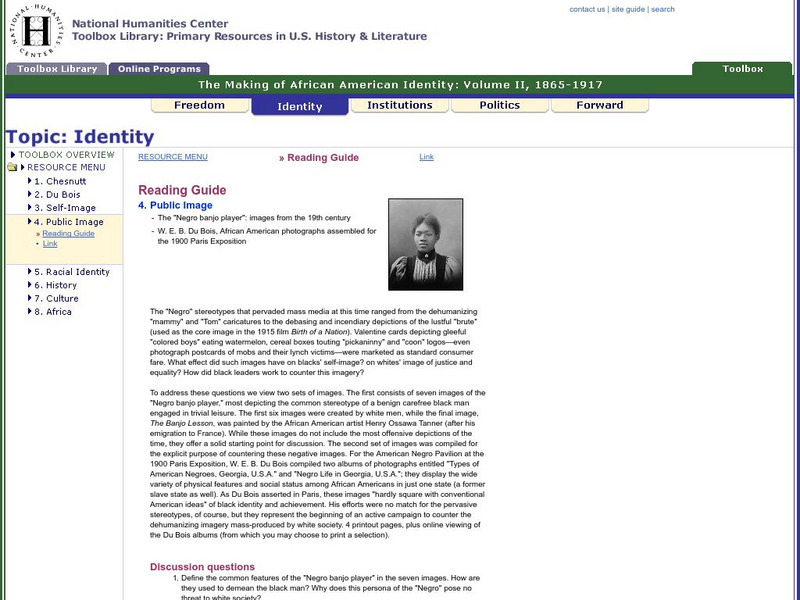National Humanities Center
National Humanities Center: America in Class: American Revolution as Civil War
A lesson where students examine the journal of a young Scottish woman, Janet Schaw, visiting North Carolina in 1775. She writes of her experiences observing the tensions and rivalries in the Cape Fear River area that pitted neighbors...
National Humanities Center
National Humanities Center: America in Class: Successful European Colonies in the New World
Lesson using primary source material on European attempts to establish colonies in the New World and why some were successful but most failed.
National Humanities Center
National Humanities Center: America in Class: Failed European Colonies in the New World
Lesson that examines some of the reasons European efforts to establish colonies in the New World were often met with failure. It focuses on the story of nine Jesuit priests who started a small colony on Chesapeake Bay in the hopes of...
National Humanities Center
National Humanities Center: America in Class: Early Visual Representations of the New World
A lesson that examines how Native Americans were portrayed by artists in the sixteenth century, whose aim was to convey their appearance to a European audience, and thereby encourage investment in future New World explorations. By...
National Humanities Center
National Humanities Center: Teacher Serve: Freedom's Story: The Civil Rights Movement: 1968 2008
An excellent essay from the National Humanities Center that explores the civil rights movement after the groundbreaking legislation in the 1960s. It looks at how the civil rights movement has transitioned in the last part of the 20th and...
National Humanities Center
National Humanities Center: America in Class: America in the 1920s: Felix the Cat
The National Humanities Center presents collections of primary resources compatible with the Common Core State Standards - historical documents, literary texts, and works of art - thematically organized with notes and discussion...
National Humanities Center
National Humanities Center: Toolbox Library: The West, the Gilded and the Gritty: America, 1870 1912
Four nineteenth-century landscape paintings that suggest the meaning of the West in American life.
National Humanities Center
National Humanities Center: Toolbox Library: New Frontier, the Gilded and the Gritty: America, 1870 1912
A speech and an essay that alternately praise the acquisition of foreign territory by the U.S. and that raise questions about the costs and value of these imperialistic adventures.
National Humanities Center
National Humanities Center: Toolbox Library: Documents Relating to the Mormon Migration
Primary documents related to the promotion of and resistance to the expansion of Mormonism.
National Humanities Center
National Humanities Center: Toolbox Library: Frederick Douglass: Appendix to Narrative of the Life of Am. Slave
The appendix to Frederick Douglass's well-known autobiography in which he castigates Americans' embrace of Christianity as hypocritical.
National Humanities Center
National Humanities Center: Toolbox Library: Reading Guide: David Walker, From "Appeal"
Brief biographical information about David Walker and a link to the complete text of his famous writing, "Appeal," written in 1830.
National Humanities Center
National Humanities Center: Toolbox Library: Culture of Common Man: Ralph Waldo Emerson, Excerpts From "Self Reliance"
Emerson's famous essay emerging from the Transcendentalist period that celebrates unfettered individualism.
National Humanities Center
National Humanities Center: Toolbox Library: Reading Guide: Henry David Thoreau, "Walden"
Thoreau offers in this excerpt from Walden the Transcendentalist observation that each human must search for religious meaning within himself and not as a quest to glorify God.
National Humanities Center
National Humanities Center: Toolbox Library: Nathaniel Hawthorne: "My Kinsman, Major Molineux"
Hawthorne's short story that examines how America has changed in the generation since the Revolution by depicting the growth and challenges faced by a young man in the story.
National Humanities Center
National Humanities Center: Toolbox Library: America in 1850: Henry Clay: Review of the Debate on the Compromise Bills
Henry Clay's speech in the Senate in support of the Compromise of 1850 and the importance of preserving the Union.
National Humanities Center
National Humanities Center: Toolbox Library: Reading Guide: John C. Calhoun
An essay by the South Carolina Senator John C. Calhoun, outlining his belief in a "concurrent majority" and the power of individual majority groups to determine whether to follow a particular law that had been passed.
National Humanities Center
National Humanities Center: Toolbox Library: America in 1850: Daniel Webster: Speech to the u.s. Senate, March 7, 1850
Links to Senator Daniel Webster's famous plea, amidst the turmoil of sectional conflict, for national unity and his support of the Compromise of 1850.
National Humanities Center
National Humanities Center: Toolbox Library: Charles W. Chesnutt, Making of African American Identity: V. 2
A short story that explores the influence of the Southern plantation past on African American efforts to create new urban identities and the predicaments of post-emancipation life.
National Humanities Center
National Humanities Center: Toolbox Library: Making of African American Identity: w.e.b. Du Bois, Souls of Black Folk
A chapter that explores how white perceptions influence African American identity. Although granted freedom, citizenship, and suffrage by the Civil War amendments, W. E. B. Du Bois explains how the emancipated black person had yet to be...
National Humanities Center
National Humanities Center: Toolbox Library: Self Image, Making of African American Identity: V. 2
An editorial and four poems that explore African American strivings for self-esteem in the late-nineteenth century. All documents referenced within this resource attempt to shine a light on African American self-image and identity.
National Humanities Center
National Humanities Center: Toolbox Library: Making of African American Identity: Public Image
The resources examines images that illustrate and challenge black stereotypes of the late-nineteenth century, primarily focusing on W. E. B. Du Bois' African American photographs assembled for the 1900 Paris Exposition.
National Humanities Center
National Humanities Center: Toolbox Library: History, Making of African American Identity: V. 2
An art exhibit and a chapter that illustrate African American efforts to create a usable past. Aspects of African American history, character, and potential are illustrated within this resrouce through Edward Johnson's promotion of...
National Humanities Center
National Humanities Center: Toolbox Library: Culture, Making of African American Identity: Vol. 2, 1865 1917
A chapter, an interview, and film clips that illustrate cultural expressions of African American identity in the late-nineteenth century. Culture is explored during the turn of the 20th century within this resource and is supported by...
National Humanities Center
National Humanities Center: Toolbox Library: Africa, Making of African American Identity: V. 2
Photographs and an address that illustrate the role Africa played in black identity in the late-nineteenth century. This article compares Rev. Henry McNeal Turner's "back to Africa" campaign with the Exoduster migration to Kansas led by...























